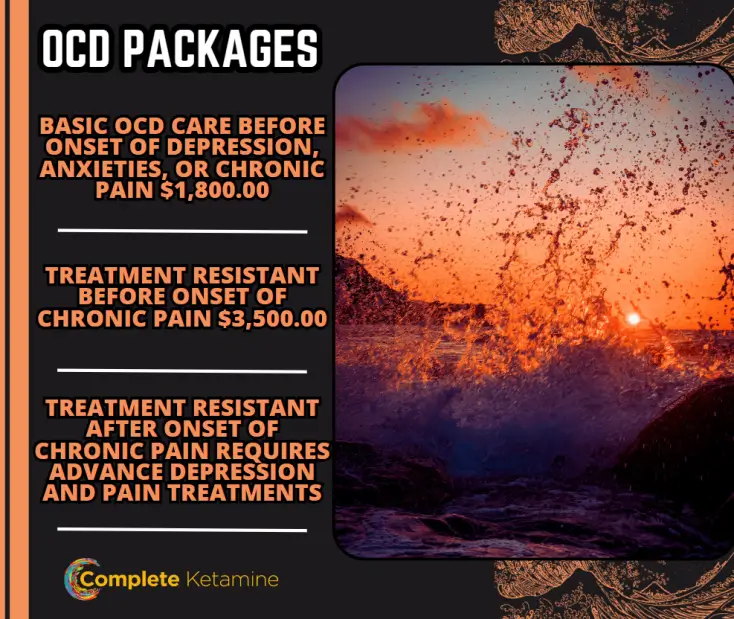How Does Ketamine Help OCD?
Obsessive-Compulsive Disorder (OCD) and Control
Obsessive-Compulsive Disorder (OCD) is not just about intrusive thoughts or repetitive behaviors—it is fundamentally about control. Patients with OCD often experience an overwhelming need to control their environment, routines, and emotions in an attempt to avoid discomfort or uncertainty. KBlend focuses on surrender and vulnerability, helping individuals break free from the cycle of compulsive control and reconnect with their emotional selves.
Advaning Symptom of Depression
Many suffering with OCD believe they have overcome or conquered depression. However, when depression is viewed as a loss of functional ability in the brain rather than a state of sadness, OCD is often an advanced symptom of depression. Patients have unconsciously replaced lost emotions—such as joy from hobbies, appreciation of beauty, and intimacy in relationships—with a rigid system of control. The underlying belief is: “If I do the right things, then I will be okay.” While this strategy may create a sense of order, it often comes at the cost of emotional well-being.
1. Breaking Compulsive Thought Loops
OCD is largely driven by dysfunction in the cortico-striato-thalamo-cortical (CSTC) circuit, the brain network responsible for decision-making, impulse control, and habit formation. Studies have shown that ketamine helps interrupt these rigid neural loops, reducing the compulsive need to repeat behaviors or seek reassurance.
2. Neuroplasticity & Emotional Reconnection
Ketamine promotes neuroplasticity, allowing the brain to form new, healthier thought patterns. As these new pathways emerge, patients often regain access to emotions they had unknowingly suppressed. Instead of replacing intimacy with logic or control, they begin to experience the richness of relationships again.
One of the most profound shifts observed with ketamine therapy is the recognition that control does not lead to emotional fulfillment. Many OCD patients realize that while they may be able to extract behaviors and outcomes from people, there is often a void of satisfaction in their relationships. Ketamine facilitates the release of control, allowing for true connection and emotional presence.
One of the most profound shifts observed with ketamine therapy is the recognition that control does not lead to emotional fulfillment. Many OCD patients realize that while they may be able to extract behaviors and outcomes from people, there is often a void of satisfaction in their relationships. Ketamine facilitates the release of control, allowing for true connection and emotional presence.
3. The Role of Family & the Military-Style Home
A striking example of this phenomenon can be seen in children raised in highly structured, emotionally rigid households. These children often appear successful—they get good grades, follow routines, and maintain a polished image. However, beneath this surface, their emotional function is slipping away. They perform, but they disconnect emotionally.
Interestingly, research has shown that when parents improve emotionally, children with their natural neuroplasticity tend to lean back into the family without external intervention. When the emotional environment of the home shifts, children instinctively re-engage, mirroring the healing process observed in OCD patients when they begin to surrender their need for control.
Interestingly, research has shown that when parents improve emotionally, children with their natural neuroplasticity tend to lean back into the family without external intervention. When the emotional environment of the home shifts, children instinctively re-engage, mirroring the healing process observed in OCD patients when they begin to surrender their need for control.
Final Thoughts
Ketamine offers a profound opportunity for OCD patients to step out of rigid, compulsive behaviors and into a space of emotional flexibility. By interrupting dysfunctional thought loops, enhancing neuroplasticity, and fostering emotional reconnection, ketamine provides a pathway to healing that traditional OCD treatments often fail to reach. Through KBlend’s emphasis on surrender and vulnerability, patients can rediscover the joy of the journey rather than clinging to the illusion of control.
Buying Options:
- Category: OCD
- All pricing packages are subject to medical approval
- Refunds offered if a patient does not qualify for a discounted internet purchase
- Internet pricing only available online when paid in advance of consultation
- Internet pricing not available in-store or over the phone
For more details on ketamine treatment, pricing, and eligibility, visit our FAQ page.
What to Know Before Starting Ketamine Therapy
1. Schedule and Commitment
- ALL Treatments are performed in Monroe or Lansing Location.
- Most patients undergo two to three treatments per week over a two to three-week period.
- A typical initial treatment series consists of six infusions.
- Larger Packages may include more than 6 infusions.
- Intervention is one-time, one infusion, unless altered by provider
2. Transportation / Post-Treatment
- Patients must arrange for a driver to and from the clinic due to post-treatment effects.
- After each infusion, patients are monitored to ensure stability before discharge.
- Patients and Drivers will be given discharge instructions.
3. Pre-Treatment Preparations
- On the day of your session, avoid heavy meals to reduce nausea.
- Stay well-hydrated leading up to your appointment.
- Stop eating and drinking 4 hours prior to treatment.
- Do not come in dehydrated!
4. Medical Considerations
- Patients with high blood pressure should have their condition controlled before starting treatment.
- During treatment, vital signs (heart rate, blood pressure, oxygen levels) are closely monitored.
- Avoid Conflict and difficult situations before treatment.
5. Potential Side Effects
- Some patients may experience dissociation (a floating sensation or altered perception).
- Mild nausea can occur but can often be managed with proper dietary adjustments.
6. Patient & Caregiver Education
- Understanding the process and potential side effects helps ensure a successful treatment experience.
- Patients and caregivers should review all information before starting therapy.

